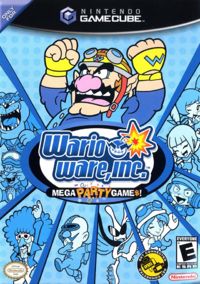WarioWare, Inc.: Mega Party Game$!

| |
| WarioWare, Inc.: Mega Party Game$! | |
| Developer | Nintendo |
| Publisher | Nintendo |
| System | Nintendo GameCube |
| Release Date | JP October 17, 2003 US April 6, 2004 EU September 3, 2004 |
| Gallery | GH Gallery |
| Rating | ESRB: E |
Mega Party Game$! is the second game released in the WarioWare series. It is mostly based on the original release with a focus on the brand new multiplayer mode. A brand new set of competitive microgames are found exclusively in this game.
Gameplay[edit]
Single Player[edit]
The Single Player mode is basically a straightforward playthrough of the original game's microgames going in a specified order. The setup is going up an elevator with the only sign of transition being when the character's face on the elevator changes. After beating the main game more modes are unlocked, most similar to the GBA game, such as mixed up levels or timed runs. There is also a hard mode that takes the player straight through the main game again except with all microgames set to their highest difficulty with only one life.
There are some other bonuses in the single-player mode such as watching some of the demo cutscenes involving the character, viewing character profiles, or watching music videos.
Multiplayer[edit]
Every developer from the original game returns with their own special multiplayer mode.
Jimmy T. has the most basic game with players compete on the dance floor and simultaneously play microgames. After 3 misses, the player is disqualified until one remains.
In Wario's game, players take turns playing a set of microgames. The catch is that those not playing can walk around the screen and enlarge their sprite, distracting the player.
9-Volt's game references the e-Reader. A Game Boy Advance is on screen as e-Reader cards are scanned into it. Characters take turns playing the microgame on the card. If they win, they earn another card for their pile. While one character is playing, the others move freely about the screen stealing cards from other piles. The one with the most at the end wins.
Dr. Crygor's game is somewhat like Hot Potato. Characters take turns playing microgames while the rest will pump a balloon. The character playing when the balloon pops is the loser. If one player loses a microgame, they are stuck playing another turn increasing the chances of them being disqualified.
In Kat and Ana's game, players attempt to balance on turtles. First players compete is a special multiplayer microgame. The winner will face a regular microgame on their. If they win, they make balancing harder for the other players but if they lose, they make it much harder for themselves. Between rounds, players maneuver the control stick to balance on their stack of turtles. The player that remains is the winner. Eliminated players can sabotage other players during the balancing round or by winning the multiplayer microgame.
Dribble and Spitz's game takes place in space and is somewhat based on Othello. Players are presented with a large board. When they successfully beat a microgame they shoot part of the board, with a small portion of it color coded in their favor. Other players can continue to manipulate the board in their favor until all spaces are taken. The player with the most spaces will fight against a giant robot boss by once again playing a microgame, with the catch being that all the opponents spaces still remain, blocking the view.
Mona's game is rather unique. A odd-looking doctor appears on the screen and challenges each player to do something while playing the microgame. Directions such as bark like or play with the controller upside down. Because the game cannot see the player performing such actions, the other players clap in the game based on how well the current one performed. If a job wasn't well done, they can choose not to clap at all. The player with the most feedback wins.
In Orbulon's game, there is a shift from competing to cooperation. The screen is pitch black with one person playing the microgames and the rest in charge of flashlights to help the main player see better. The game goes for as long as the main player keeps winning. A rank is given to the group depending on how long they lasted.
There are also multiplayer games that are not run by one of the developers. A Paper Plane race and a simultaneous jump rope game make up the four player games. Uniquely, the game allows for up to 16 players by passing around one controller. A marathon where players take turns playing microgames and a jump rope game where they take turns jumping one at a time take advantage of this feature.
Sequels[edit]
The next WarioWare game to hit consoles was Smooth Moves on the Wii. While it did have a party mode, it also had it's own series of original microgames designed to take advantage of the Wii Remote. One of the party games however, was a remake of Dr. Crygor's Balloon Popping game. A 2-player version of the Paper Plane race was released on DSIWare.
| Titles in the Wario Series |
|---|
| Wario Land - VB - II - 3 - 4- World - Master of Disguise - Shake It! WarioWare - Mega Party Game$! - Touched! - Twisted! - Smooth Moves - Snapped! - D.I.Y. (Showcase) Game & Wario - WarioWare Gold - Get It Together! - Move It! |